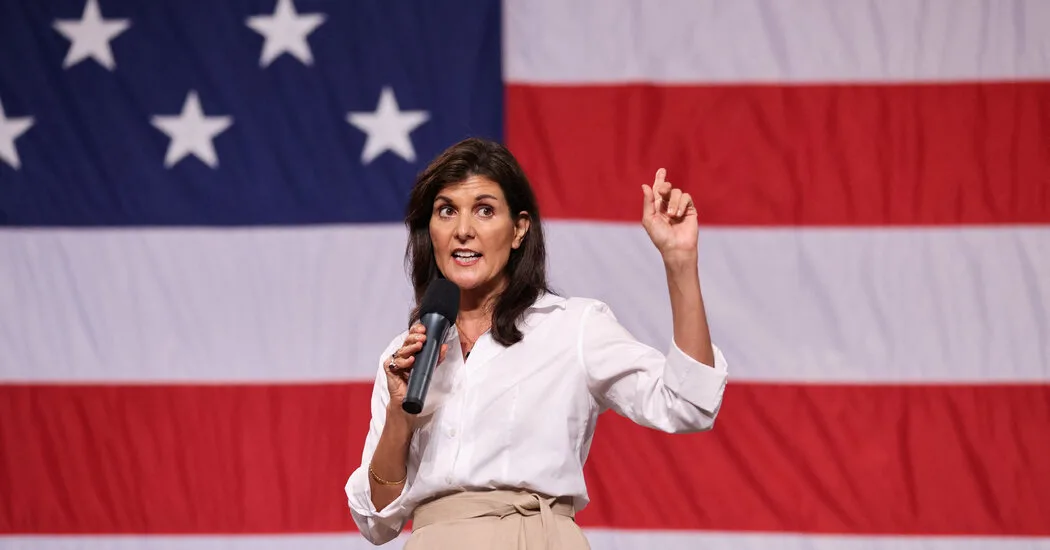
Nikki Haley, fresh off a strong debate performance last week, was back on the trail and took a moment to condemn the weekend shooting in Jacksonville, Fla.
Breaking from her usual stump speech at a South Carolina town hall event on Monday, Nikki Haley paused to condemn a deadly weekend rampage in Jacksonville, Fla., that the authorities were investigating as a hate crime.
“I am not going to lie to you, it takes me back to a dark place,” Ms. Haley told an audience of roughly 1,000 people gathered in a corporate campus auditorium in Indian Land. “There is no place for hate in America.”
Ms. Haley was governor in 2015 when a white supremacist opened fire in an African American church in Charleston, S.C., and killed nine Black parishioners at a Bible study. Ms. Haley eventually called for the removal of the Confederate battle flag from the grounds of the South Carolina Capitol. She later described struggling with the beginning effects of post-traumatic stress disorder in response to the shooting, but she said that the victims’ families showed her what strength and grace looked like.
Ms. Haley also toed the Republican Party line on guns and racism, suggesting that such violence and mass shootings could be prevented if Americans improved mental health services, abided by gun laws and rejected division and hate in their everyday lives.
She renewed her calls for the need to reverse what she often describes as a “national self-loathing,” or the idea that “America is bad or that America is rotten or that it is racist.”
“Don’t fall into the narrative that this is a racist country,” she told the mostly white and graying crowd, citing her own election in 2010 as the first woman and person of color to lead the state as progress. “It was only 60 years ago today that Martin Luther King gave that speech. Look at how far we have come.”
The way Ms. Haley, a former United Nations ambassador, and other Republican presidential candidates tend to downplay structural racism and prejudice — and to focus on the nation’s racial progress — puts them at odds with most Black voters.
On Monday, Ms. Haley’s home state rival in the presidential race, Senator Tim Scott, called the Florida rampage “heinous.” He said that the killings had prompted patrons at his church service to discuss “the absolute devastation” in 2015 at Emanuel African Methodist Episcopal Church in Charleston.
Asked whether the Republican Party had done enough to denounce white supremacist violence, Mr. Scott argued that it was the duty of every American, regardless of party affiliation, to do their part. “The question is, Have humans done enough to talk about racism and discrimination that leads to violence and to death,” he said.
On Monday, Ms. Haley was back in her home state for a victory lap after a strong performance in the first Republican primary debate. In recent days, her polling numbers have climbed, and top donors have seen her as a standout. So many people packed into her town hall at the CrossRidge Center in Indian Land that attendees filled a balcony and an overflow room.
As they return to the campaign trail, Ms. Haley and Vivek Ramaswamy, a biotech entrepreneur and political newcomer, have continued the clashes they started on the debate stage, where they tussled over policy on China, Israel and the war in Ukraine. Mr. Ramaswamy has unveiled his foreign policy platform, and on his website, he accuses Ms. Haley of lying about his stances on Israel, and calls her by her first and maiden last name, Nimarata Randhawa.
For her part, Ms. Haley did not mention Mr. Ramaswamy by name, but she elicited loud laughter from the audience on Monday when she asked voters if they had watched the debate.
“Bless his heart,” she said. “I know I wear a skirt. But y’all see me at work. If you say something that is totally off the wall, I am going to call you out on it.”
Leaving the town hall, Ross Payne, 62, a former managing director for Wells Fargo, said that he supported Ms. Haley, whom he called the “Iron Lady,” a reference to Margaret Thatcher and a hero of Ms. Haley. But he said he had been somewhat disappointed with her answer to his question on whether she would be willing to pull from both sides of the political aisle to regulate guns and automatic weapons.
Ms. Haley said that though she worried about her own children, people should have the ability to protect themselves, and that she would improve access to mental health services and ensure that people arrested for gun violations stay behind bars.
“Like with abortion, can’t we all agree that if you want an AR semiautomatic weapon, you’ve got to go through two or three weeks of training and extensive vetting before you can get your hands on a weapon like that?” Mr. Payne said, echoing Ms. Haley’s calls at the debate for consensus on abortion. “A weapon that can kill, you know, 10 people in 10 seconds.”
Maya King contributed reporting from Charleston, S.C., and Maggie Astor from New York.


